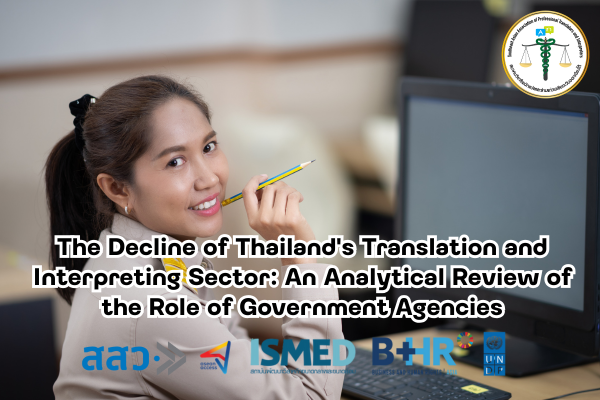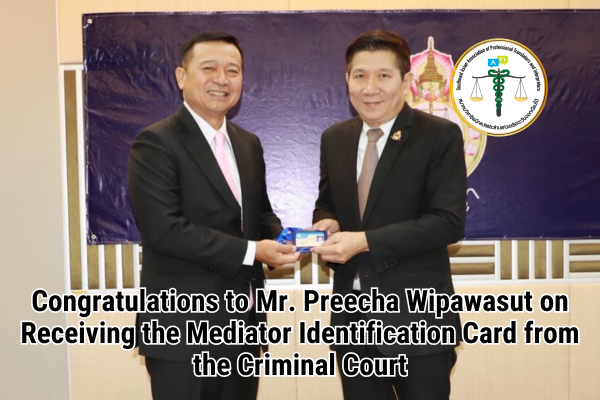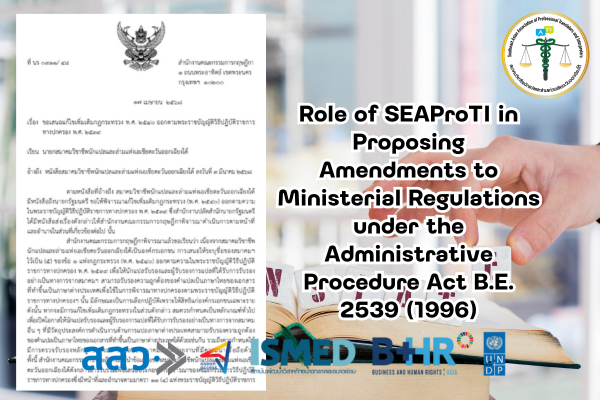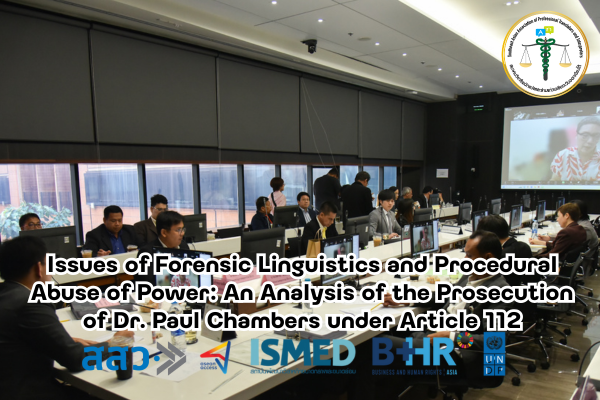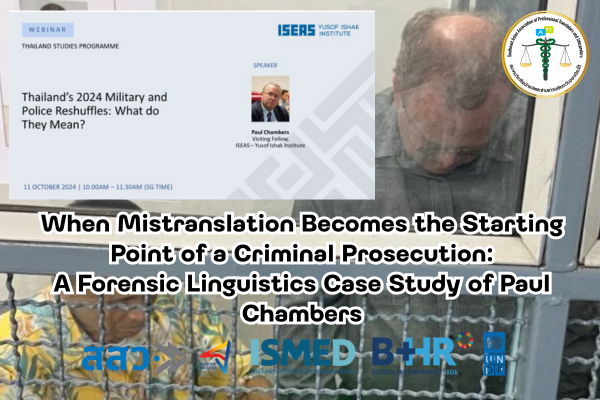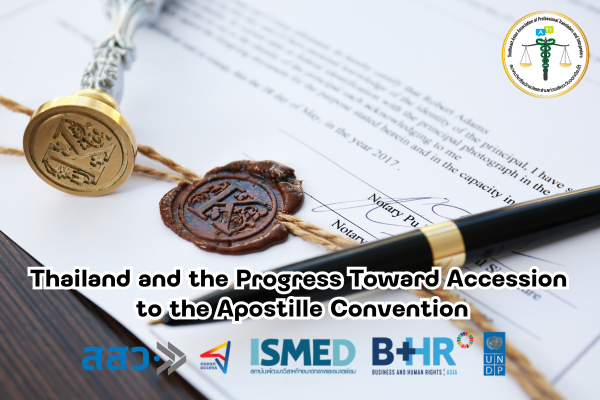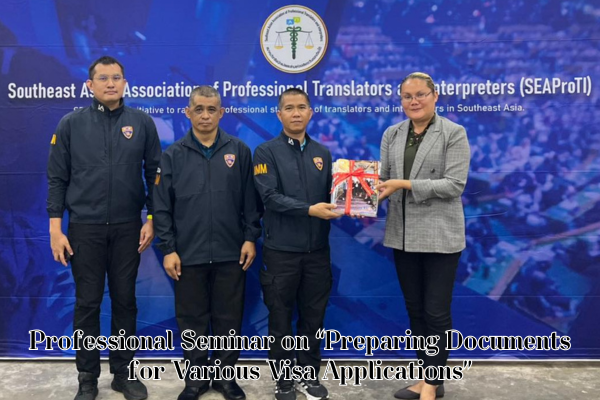The Decline of Thailand’s Translation and Interpreting Sector:
An Analytical Review of the Role of Government Agencies
April 26, 2025, Bangkok – The translation and interpreting sector in Thailand has long been an integral part of the country’s societal ecosystem. However, a closer examination of the history of this profession reveals that much of the deterioration observed today stems largely from the actions of government agencies. These issues arise not only from a lack of deep understanding among those operating at the front lines but also from laws and policies formulated by individuals who have never engaged in real translation or interpreting work. The result has been a systematic erosion of the profession’s structure and integrity.
The root of the problem lies primarily in the way government agencies appoint and accredit translators and interpreters without any clear professional standards. There is often no testing of knowledge, skills, or the specialized competencies required for legal translation and interpreting tasks, such as translating court judgments, official documents, or interpreting during judicial proceedings. Frequently, agencies select individuals who merely possess bilingual abilities, without assessing their understanding of legal language, formal administrative discourse, or professional ethics. A striking example can be seen in the case study concerning Article 112 and Paul Chambers. Examination of parliamentary committee reports suggests that translators may have been used as tools to serve hidden political agendas by distorting the meaning of documents to wrongfully incriminate and suppress the rights and freedoms of innocent individuals. Such actions not only destroy lives but also severely undermine the credibility of Thailand’s justice system in the eyes of the global community.
Another major concern is the persistent view within government agencies that translation and interpreting are merely ancillary tasks, rather than specialized professions requiring scientific expertise. This flawed perception leads many agencies to assign translation and interpreting work to anyone with bilingual abilities, without requiring proper training or certification. In reality, translation and interpreting are academic disciplines that demand skills in contextual analysis, mastery of specialized terminology, and strict adherence to ethical standards. A single word can shift dramatically in meaning depending on its context; technical writing demands neutrality, while critical commentary may carry tones of sarcasm or condemnation. Without mastery of these nuances, the accuracy and integrity of communication are severely compromised — a reality that professional translators and interpreters must deeply understand, beyond simple word-for-word rendering.
The problem extends further into the misuse of administrative authority, where unqualified personnel such as police officers or military staff are assigned to perform translation and interpreting duties, particularly in criminal cases. Assigning legally significant translation tasks, such as translating verdicts, to untrained individuals introduces not only high risks of mistranslation but also raises concerns of bias and partiality, constituting serious violations of human rights principles. Such practices have damaged Thailand’s international reputation for transparency and fairness in its judicial processes.
Additionally, the structuring of Terms of Reference (TOR) for translation service procurement reflects a deep misunderstanding of the profession. Often, procurement criteria focus solely on the lowest price or require only that the service provider be a registered company, with no regard for whether translators or interpreters are properly certified or professionally qualified. This approach results in low-quality translations, inaccuracies, and a cascade of negative consequences for state operations.
The impact of these failures is profound, both on individuals and society at large. In the justice system, using uncertified interpreters in criminal, labor, or administrative cases has led to misinterpretations that cost defendants their rights, their freedom, and sometimes their careers and reputations. Errors in contract translation or mediation interpreting have fueled litigation and economic losses on a massive scale. At the international level, diplomatic misunderstandings and breaches of protocol due to poor translation have damaged Thailand’s relations with other states. Most tragically, the public perception of professional translators and interpreters has been eroded; society increasingly views the profession as simple service work that anyone can perform, leading to wage suppression, falling standards, and cutthroat competition without regard for ethics.
A structural analysis reveals that one of the most fundamental issues is the lack of a centralized body that sets translation and interpreting standards based on international professional norms. Although the Southeast Asian Association of Professional Translators and Interpreters (SEAProTI) has taken steps to establish professional standards in Thailand, the association’s reach remains limited. This is largely due to the widespread presence of low-quality practitioners who have never received proper training. Many Thai translators and interpreters undergo minimal or inadequate professional development yet often accept high-stakes assignments, causing significant and widespread damage to the country’s interests. Furthermore, there is a glaring absence of enforcement mechanisms for professional ethics, as well as a systematic disregard for the expertise and recommendations of genuine professional associations in policymaking processes.
Addressing these deeply rooted issues requires the establishment of legal frameworks or national regulations that clearly define the qualifications required for translators and interpreters in government contexts. Such requirements should mandate the completion of specialized programs or certification by a transparent and impartial professional body, such as the Southeast Asian Association of Professional Translators and Interpreters (SEAProTI). Alongside this, government procurement guidelines must shift from prioritizing the lowest bidder to prioritizing quality assurance in translation and interpreting services. Moreover, there must be a formal system for receiving complaints, investigating, and sanctioning poor translation and interpreting performance within state institutions, to protect the rights of the public and elevate the credibility of the profession.
Ultimately, the restoration of Thailand’s translation and interpreting sector cannot be achieved merely through superficial reforms. It demands a deep, structural understanding of the underlying problems and the building of a system anchored in international professional standards. Only through such genuine and sustained efforts can translators and interpreters reclaim their rightful status as highly specialized professionals who play a critical role in advancing society and upholding the rule of law in the country.
SEAProTI’s certified translators, translation certification providers, and certified interpreters:
The Southeast Asian Association of Professional Translators and Interpreters (SEAProTI) has officially announced the criteria and qualifications for individuals to register as “Certified Translators,” “Translation Certification Providers,” and “Certified Interpreters” under the association’s regulations. These guidelines are detailed in Sections 9 and 10 of the Royal Thai Government Gazette, issued by the Secretariat of the Cabinet under the Office of the Prime Minister of the Kingdom of Thailand, dated July 25, 2024, Volume 141, Part 66 Ng, Page 100.
To read the full publication, visit: the Royal Thai Government Gazette
ความวิบัติในแวดวงการแปลและล่ามไทย: บทวิเคราะห์บทบาทของหน่วยงานราชการ
26 เมษายน 2568, กรุงเทพ – แวดวงการแปลและล่ามในประเทศไทยเป็นระบบนิเวศที่อยู่คู่สังคมไทยมาช้านาน หากแต่เมื่อเราสำรวจประวัติศาสตร์ของอาชีพนี้อย่างลึกซึ้ง จะพบว่า ความวิบัติที่เกิดขึ้นในวงการนี้มีรากเหง้ามาจากการดำเนินการของหน่วยงานราชการจำนวนไม่น้อย ทั้งจากความไม่เข้าใจลึกซึ้งของคนที่ทำงานหน้างานจริง ไปจนถึงการกำหนดนโยบายหรือกฎหมายโดยบุคคลที่ไม่ได้ผ่านการปฏิบัติงานด้านการแปลหรือการล่ามจริง ส่งผลให้เกิดการบ่อนทำลายโครงสร้างอาชีพนี้อย่างเป็นระบบ
ต้นตอสำคัญของปัญหาเริ่มต้นจากการที่หน่วยงานราชการแต่งตั้งและรับรองบุคคลเป็นนักแปลหรือล่ามโดยปราศจากเกณฑ์วิชาชีพที่ชัดเจน ไม่มีกระบวนการสอบวัดความรู้หรือทักษะเฉพาะทางที่จำเป็นสำหรับงานแปลและล่ามทางกฎหมาย เช่น การแปลคำพิพากษา เอกสารราชการ หรือการล่ามในการดำเนินคดีตัวต่อตัว บ่อยครั้ง หน่วยงานเหล่านี้ใช้วิธีเลือกบุคคลที่เพียงพูดได้สองภาษาโดยขาดการประเมินว่าบุคคลนั้นมีความรู้ทางภาษากฎหมาย ภาษาทางการ หรือจรรยาบรรณวิชาชีพเพียงพอหรือไม่ ตัวอย่างที่เห็นได้ชัดคือกรณีศึกษาการแปลเอกสารในคดีที่เกี่ยวกับมาตรา 112 ของ พอลล์ เชมเบอร์ส ซึ่งจากการศึกษารายงานการประชุมของคณะกรรมาธิการฝ่ายทหาร พบว่า อาจมีการใช้นักแปลเป็นเครื่องมือสนองตอบต่อวาระซ่อนเร้นทางการเมือง ด้วยการตีความเอกสารหรือเนื้อหาที่แปลผิดไปจากข้อเท็จจริง เพื่อกลั่นแกล้งหรือทำลายสิทธิเสรีภาพของประชาชนผู้บริสุทธิ์ การกระทำเช่นนี้ไม่เพียงแต่ทำลายชีวิตของผู้คน แต่ยังทำลายความน่าเชื่อถือของกระบวนการยุติธรรมไทยในสายตาสังคมโลก
อีกหนึ่งปัญหาที่หนักหน่วงคือการที่หน่วยงานราชการมองการแปลและการล่ามเป็นเพียงงานเบ็ดเตล็ดทั่วไป ไม่ใช่วิชาชีพเฉพาะทางที่ต้องอาศัยศาสตร์เฉพาะด้าน ด้วยแนวคิดที่ผิดพลาดนี้ หลายหน่วยงานจึงใช้วิธีมอบหมายงานให้บุคคลที่พูดได้สองภาษาโดยไม่ผ่านการอบรมหรือรับรองคุณภาพใด ๆ ทั้งที่ในความเป็นจริง การแปลและการล่ามเป็นทักษะทางวิชาการที่ต้องอาศัยความรู้ด้านการวิเคราะห์บริบท ภาษาเฉพาะทาง และจรรยาบรรณอย่างเคร่งครัด ศัพท์เพียงคำเดียวหากอยู่ในบริบทที่ต่างกัน ย่อมทำให้ความหมายเปลี่ยนแปลงอย่างสิ้นเชิง เช่น ศัพท์ในบริบทเชิงวิชาการจะต้องมีโทนเป็นกลาง แต่หากอยู่ในบริบทเชิงวิพากษ์วิจารณ์ อาจมีน้ำเสียงเหน็บแนมหรือโจมตีอย่างรุนแรง ซึ่งทั้งหมดนี้เป็นศาสตร์ที่นักแปลและล่ามมืออาชีพ “ต้องเชี่ยวชาญ” ไม่ใช่เพียงการถอดคำศัพท์อย่างตรงตัว
ปัญหายังขยายไปถึงการใช้อำนาจทางปกครองมอบหมายงานแปลหรือล่ามอย่างผิดประเภท เช่น การให้เจ้าหน้าที่ตำรวจหรือทหารที่ไม่ได้ผ่านการอบรมทางการแปลล่ามทำหน้าที่ในคดีอาญา หรือการแปลคำพิพากษาที่มีผลผูกพันทางกฎหมาย การกระทำเหล่านี้ไม่เพียงแต่เสี่ยงต่อการแปลผิดพลาด แต่ยังนำไปสู่การแปลที่ไม่เป็นกลาง อันเป็นการละเมิดหลักการสิทธิมนุษยชนอย่างร้ายแรง ก่อให้เกิดภาพลักษณ์ที่น่าอับอายในสายตาชุมชนระหว่างประเทศว่ากระบวนการยุติธรรมไทยไม่โปร่งใสและไม่น่าเชื่อถือ
การตั้งข้อกำหนดในการจัดจ้างแปลเอกสารราชการก็เป็นอีกหนึ่งปัญหาเชิงโครงสร้างที่สะท้อนความไม่เข้าใจลึกซึ้งในวิชาชีพการแปลและล่าม การกำหนด TOR ที่พิจารณาเพียงราคาต่ำสุด หรือการขอเพียงให้มีบริษัทจดทะเบียน โดยไม่คำนึงถึงการรับรองคุณภาพหรือมาตรฐานของนักแปลหรือล่าม ส่งผลให้การแปลที่ได้มีคุณภาพต่ำ ขาดความแม่นยำ และส่งผลกระทบเป็นลูกโซ่ต่อการดำเนินงานของรัฐ
ผลกระทบที่เกิดขึ้นจากความวิบัติเหล่านี้มีมหาศาล ทั้งในระดับปัจเจกบุคคลและระดับสังคม โดยเฉพาะความผิดพลาดในกระบวนการยุติธรรมที่เกิดจากการใช้ล่ามไม่ได้มาตรฐานในคดีอาญา คดีแรงงาน หรือคดีปกครอง ก่อให้เกิดการตีความผิด ทำให้จำเลยเสียสิทธิ เสียเสรีภาพ และในบางกรณีถึงขั้นสูญเสียชีวิตการงานและชื่อเสียง การแปลผิดในสัญญาทางการค้า การล่ามผิดในกระบวนการไกล่เกลี่ย ยังส่งผลให้เกิดการฟ้องร้องจำนวนมาก นำมาซึ่งความเสียหายทางเศรษฐกิจอย่างที่ไม่อาจประเมินค่าได้ ในระดับระหว่างประเทศ การใช้การแปลที่ผิดพลาดในเอกสารทางการทูต หรือการล่ามผิดธรรมเนียมในการเจรจาต่างประเทศ ทำให้เกิดความเข้าใจผิดระหว่างประเทศ และสร้างความเสียหายต่อความสัมพันธ์ระหว่างรัฐในระยะยาว ที่น่าเศร้าที่สุดคือ ภาพลักษณ์ของนักแปลและล่ามมืออาชีพถูกริดรอน กลายเป็นความเข้าใจผิดในสังคมว่าอาชีพนี้เป็นเพียงงานบริการทั่วไปที่ใครก็ทำได้ นำไปสู่การกดค่าจ้าง มาตรฐานตกต่ำ และการแข่งขันที่ปราศจากจรรยาบรรณ
เมื่อวิเคราะห์รากเหง้าเชิงโครงสร้าง จะพบว่าหนึ่งในปัญหาหลักคือการขาดหน่วยงานกลางที่วางมาตรฐานนักแปล-ล่ามตามหลักวิชาชีพสากล แม้ปัจจุบัน สมาคมวิชาชีพนักแปลและล่ามแห่งเอเชียตะวันออกเฉียงใต้ จะได้เข้ามาสร้างมาตรฐานให้กับประเทศไทย แต่สมาคมก็ยังจำกัดการให้บริการในแวงแคบ เนื่องจากนักแปลและล่ามจำนวนมากในประเทศมีคุณภาพและมาตรฐานที่ต่ำ ความเข้าใจผิดที่ตีความว่านักแปล-ล่ามเป็นเพียง “งานบริการ” ไม่ใช่วิชาชีพวิชาการ ทำให้ขาดระบบการอบรมต่อเนื่อง นักแปลและล่ามไทยขาดการอบรมที่มีคุณภาพ หรืออบรมน้อย และมักรับงานในระดับสูง จึงสร้างความเสียหายให้กับประเทศเป็นอย่างยิ่ง และเสียหายในวงกว้าง และการบังคับใช้จรรยาบรรณวิชาชีพในเชิงปฏิบัติจริง นอกจากนี้ยังมีการละเลยเสียงสะท้อนจากสมาคมวิชาชีพที่แท้จริงในกระบวนการออกกฎระเบียบและนโยบายสำคัญ ๆ ของรัฐ
ทางออกของปัญหาเหล่านี้ต้องเริ่มจากการกำหนดกฎหมายหรือระเบียบกลางว่าด้วยคุณสมบัติของนักแปลและล่ามสำหรับการใช้ในหน่วยงานราชการ โดยกำหนดให้ต้องจบหลักสูตรเฉพาะทาง หรือผ่านการรับรองจากสมาคมวิชาชีพที่ได้รับการประกาศรับรองอย่างโปร่งใสและเป็นกลาง เช่น สมาคมวิชาชีพนักแปลและล่ามแห่งเอเชียตะวันออกเฉียงใต้ (SEAProTI) ควบคู่กับการปรับเปลี่ยน TOR การจัดจ้างของรัฐให้เน้นคุณภาพ ไม่ใช่ราคาต่ำสุด เพื่อรักษามาตรฐานของงานแปลและล่ามในประเทศ นอกจากนี้ ควรมีระบบร้องเรียน ตรวจสอบ และสอบสวนกรณีการแปลหรือล่ามผิดพลาดในกระบวนการราชการอย่างเป็นรูปธรรม เพื่อปกป้องสิทธิของประชาชนและยกระดับความน่าเชื่อถือของวิชาชีพนี้ในระยะยาว
การฟื้นฟูวงการแปลและล่ามไทยจึงไม่ใช่เพียงการแก้ไขข้อผิดพลาดเฉพาะหน้า แต่ต้องเริ่มจากการเข้าใจปัญหาเชิงโครงสร้างอย่างลึกซึ้ง และการสร้างระบบที่ยึดถือมาตรฐานวิชาชีพตามหลักสากลอย่างแท้จริง เพื่อให้อาชีพนักแปลและล่ามได้รับการเคารพในฐานะ “วิชาชีพเฉพาะทาง” ที่มีบทบาทสำคัญต่อการขับเคลื่อนสังคมและการค้ำจุนหลักนิติธรรมของประเทศ
เกี่ยวกับนักแปลรับรอง ผู้รับรองการแปล และล่ามรับรองของสมาคมวิชาชีพนักแปลและล่ามแห่งเอเชียตะวันออกเฉียงใต้
สมาคมวิชาชีพนักแปลและล่ามแห่งเอเชียตะวันออกเฉียงใต้ (SEAProTI) ได้ประกาศหลักเกณฑ์และคุณสมบัติผู้ที่ขึ้นทะเบียนเป็น “นักแปลรับรอง (Certified Translators) และผู้รับรองการแปล (Translation Certification Providers) และล่ามรับรอง (Certified Interpreters)” ของสมาคม หมวดที่ 9 และหมวดที่ 10 ในราชกิจจานุเบกษา ของสำนักเลขาธิการคณะรัฐมนตรี ในสำนักนายกรัฐมนตรี แห่งราชอาณาจักรไทย ลงวันที่ 25 ก.ค. 2567 เล่มที่ 141 ตอนที่ 66 ง หน้า 100 อ่านฉบับเต็มได้ที่: นักแปลรับรอง ผู้รับรองการแปล และล่ามรับรอง


